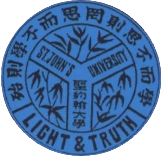St. John's University (Shanghai)
| 聖約翰大學 | |
 |
|
| Motto | 學而不思則罔 思而不學則殆 |
|---|---|
|
Motto in English
|
Light and Truth |
| Type | Private university |
| Active | 1879–1952 |
| Affiliation | Anglican |
| President | Francis Lister Hawks Pott |
| Location | Shanghai, China |
| Website | www |
| St. John's University, Shanghai | |||||||||||
| Traditional Chinese | 聖約翰大學 | ||||||||||
|---|---|---|---|---|---|---|---|---|---|---|---|
| Simplified Chinese | 圣约翰大学 | ||||||||||
|
|||||||||||
| Transcriptions | |
|---|---|
| Standard Mandarin | |
| Hanyu Pinyin | Shèng Yuēhàn Dàxué |
| Wade–Giles | Sheng Yüeh-han Ta-hsüeh |
| IPA | [ʂə̂ŋ ɥéxân tâɕɥě] |
St. John's University (SJU) was an Anglican university in Shanghai. Founded in 1879 by American missionaries, it was one of the oldest and most prestigious universities in China, often regarded as the Harvard of China.
After the founding of the People's Republic of China, the Communist government closed the university in 1952, most of its faculty members, students and library collections were transferred to the East China Normal University. Its Board of Governors moved the university to Hong Kong, founding Chung Chi College, a part of Chinese University of Hong Kong.
The university was founded in 1879 as "St. John's College" by William Jones Boone and Joseph Schereschewsky, Bishop of Shanghai, by combining two pre-existing Anglican colleges in Shanghai. The architect for the college's original quadrangle of buildings was Newark, New Jersey architect William Halsey Wood.
St. John's began with 39 students and taught mainly in Chinese. In 1891, it changed to teaching with English as the main language. The courses began to focus on science and natural philosophy.
In 1905, St. John's College became St. John's University and became registered in Washington D.C. in the United States. It thus had the status of a domestic university and American graduates of St. John's could proceed directly to graduate schools in the United States. As a result, the university attracted some of the brightest and wealthiest students in Shanghai at the time. It was the first institution to grant bachelor's degrees in China, starting in 1907.
The university was located at 188 Jessfield Road (now Wanhangdu Lu), on a bend of the Suzhou Creek in Shanghai and was designed to incorporate Chinese and Western architectural elements.
...
Wikipedia
